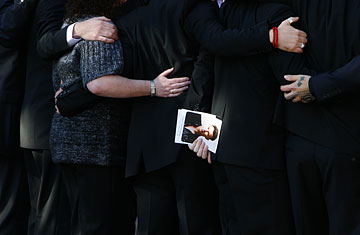
A photo of Stephen Gately is carried by other members of Boyzone and family as the coffin of the Irish pop star is carried in Dublin on Oct. 17, 2009
There's usually not much common ground between a boy-band singer and a far-right politician who would like to bar Muslim immigrants from his country. But in Britain this week, both have been at the center of fierce debates over freedom of speech.
First, the pop idol. Stephen Gately was a star in the Irish band Boyzone, which has sold about 30 million records since forming in 1993. Gately, 33, died on Oct. 10 of an acute pulmonary edema while vacationing on the Mediterranean island of Majorca with his civil partner Andrew Cowles. Amid gushing eulogies for Gately, Jan Moir, a columnist with conservative British newspaper the Daily Mail, wrote a piece that questioned whether the singer's death was, as the coroner had ruled, due to natural causes. Moir speculated that Gately's gay lifestyle may have played a part. "Healthy and fit 33-year-old men do not just climb into their pyjamas and go to sleep on the sofa, never to wake up again," she wrote. "Whatever the cause of death is, it is not, by any yardstick, a natural one." Gately's death, she added, was also a "blow to the happy-ever-after myth of civil partnerships."
Outrage over Moir's column was instantaneous and — thanks to Twitter — widespread. More than 22,000 people protested to Britain's Press Complaints Commission (PCC), an independent body that investigates and rules on complaints about newspapers and magazines. (For reference, that's nearly the same number of protests that the PCC received about all stories over the past four or five years.) Complainants alleged that Moir breached Britain's press code because what she wrote was inaccurate, intruded into grief or shock and was discriminatory. British police say they have received complaints alleging that the column incited hatred against gays. Moir has defended her article and said she had not meant to offend and that any suggestion the piece was homophobic or bigoted was "mischievous."
The far-right politician is Nick Griffin, leader of the British National Party (BNP), who has called for an end to immigration to Britain and told BNP rallies that Muslim men are plotting to defile underage British girls. Griffin is in the spotlight because the BBC invited him to take part in a television debate on Oct. 22. Critics of Griffin and the BNP — and there are millions of them — argue that giving him and his party airtime simply accords his racist views a legitimacy they do not deserve. The BBC says that because the BNP recently won two seats in the European Parliament, it has a right to a platform alongside other parties. But hundreds of people plan to protest outside the BBC's television center during Thursday night's debate.
Freedom of speech is central in both of these controversies. The PCC is investigating the complaints against Moir's column, but the incident is likely to end with a slap on the wrist. Even as the outrage over her column continues, there's a growing backlash against her leading critics. Comedic actor, writer and Twitter pioneer Stephen Fry has come in for the most censure. Columnist Brendan O'Neill wrote that Fry had used Twitter as a "virtual lynch mob" that had set press and speech freedoms back.
Griffin, too, has his defenders, at least when it comes to his right to appear on television. "I am uneasy about his appearance, accepting [the] argument that he might well come over as just another politician rather than a fascist fanatic, but I think to deny him the right to speak on television would be infinitely worse in the long run," wrote media commentator Roy Greenslade in the Evening Standard. "However distasteful it is to put up with homophobic journalists and racist politicians, censorship does not remove prejudice."
Britain, thankfully, has laws in place that stop people from inciting racial hatred or hatred on the basis of sexuality. This week's controversies are powerful reminders that authorities and citizens need to remain vigilant and call out anyone guilty of extremist behavior. It is worth being extra vigilant about those who have a track record of making statements that offend. And if people commit a crime, they should be charged and convicted. But in getting the balance right between fighting small-minded men and women and protecting freedoms that we hold dear, principles matter. Arguing that some people should not be heard because what they say is abhorrent — and may perhaps one day even limit our freedoms — is to deny them the very rights that we so vigorously seek to protect. If that principle is to mean anything, it needs to apply even when we don't like what's being said.
